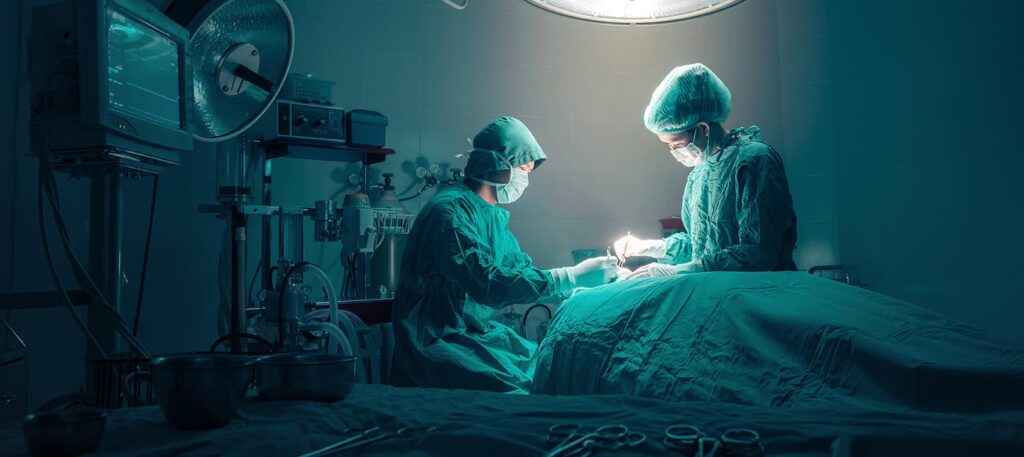GI Treatment & trauma surgery
Home > GI Treatment & trauma surgery

Gastrointestinal Disease Treatment & Trauma Surgery in Surat
Choose Dr. Jay Chokshi for emergency gastrointestinal disease treatment, surgeries, and trauma care. Whether it is an intestinal obstruction, a punctured/perforated organ, or even a penetrating abdominal trauma, the gastrointestinal surgeon understands the importance of urgent surgical intervention and will leave no stone unturned in saving the life of the patient.
Did you know gastrointestinal disorders are one of the most common reasons why patients end up in the emergency room? When a patient is suffering from symptoms such as nausea, vomiting, abdominal pain, fever, change in bowel movements, it is often a case of emergency disorders of the digestive tract. Many gastrointestinal disorders and diseases can become life-threatening and thus, they require immediate medical attention and treatment.
Dr. Jay Chokshi is South Gujarat’s 1st National Board Certified HPB and gastrointestinal surgeon with an experience of more than a decade in handling GI emergencies. His incredible understanding of gastrointestinal bleeding, GI trauma and perforated GI organs ensures the best medical attention for his patients.
WHAT IS INCLUDED IN GASTROINTESTINAL EMERGENCY & TRAUMA SURGERY?
GI emergencies of the following nature require immediate medical attention and surgical intervention.
1. PEPTIC PERFORATION PERITONITIS
Peritonitis is the inflammation of the peritoneum. It is the tissue that covers the internal walls of the abdomen and several other organs in the abdominal cavity.
If the inflammation is caused by a peptic ulcer (open sore) that is formed in the inner linings of the stomach and the upper section of the small intestine, it is called peritonitis due to peptic perforation. Patients present with severe abdominal pain, vomiting, fever and inability to pass urine and stool. The infection can become life-threatening and require an emergency surgery. Although open emergencies surgeries were a norm in the past, laparoscopic exploration is now possible to remove the infected tissue from the body.
2. SMALL BOWEL PERFORATION
Small bowel perforation, gastrointestinal perforation, ruptured bowels or perforation of the intestine occurs when there is a hole in the wall of small intestine or the large intestine (colon). The reason for the perforation can be different (such as tubercular or typhoid ulcers) among different patients. However, patients will display symptoms such as sudden and severe abdominal pain, vomiting, fever, chills and abdominal bloating. The GI surgeon will have to repair the perforation and drain the waste that have leaked into the abdominal cavity.
3. ACUTE INTESTINAL OBSTRUCTION
An acute intestinal obstruction or a bowel obstruction occurs when a blockage makes it unable for the food and liquid to pass through the intestine. The cause of the blockage can be anything from fibrous tissues (adhesions) that form in the abdomen after an abdominal or pelvic surgery, obstructed hernia, certain medications, tumors, strictures, Crohn’s disease or even diverticulitis. An intestinal obstruction may require urgent surgery depending upon the type of obstruction and cause of obstruction.
4. ACUTE MESENTERIC ISCHEMIA (AMI)
Acute mesenteric ischemia (AMI) occurs when the blood flow to the small intestine becomes suddenly inadequate. Usually, the reason behind the blockage is narrowing of the arteries due to a blood clot. Often chronic mesenteric ischemia can result in an acute problem and lead to malnutrition. The patient may have symptoms such as severe abdominal pain – disproportionate to abdominal signs, vomiting, melena, hematochezia, abdominal distention, fever and shock.
5. BLUNT & PENETRATING ABDOMINAL TRAUMA
Resulting from vehicle collisions, assaults, falls or any other type of accident, an abdominal trauma can injure the intestines, liver, spleen & pancreas. Whether the injury is penetrating (object pierces the skin and creates an open wound) or blunt (injury due to the impact without an open wound), it may require urgent surgical intervention depending upon type and site of trauma.
6. GI BLEEDING
Often a symptom of a GI disease, gastrointestinal bleeding needs immediate medical intervention. The patient may display symptoms such as blood in stool or vomit as well as black-colored stools. He/she may also present symptoms of shock such as drop in blood pressure levels, rapid pulse, unconsciousness, etc. From peptic ulcers, esophagitis, esophageal varices, diverticulosis, IBD, tumors, polyps, hemorrhoids to anal fissures, there are several reasons for the bleeding. The initial treatment includes administering fluids and blood through needle. Once the patient is stable and the bleeding does not stop on its own, the doctor will conduct the surgical procedure depending on the reason and the location of the disease.
When it comes to GI emergencies, every minute is important. A delay can become quickly fatal. If anyone around is in need of immediate medical attention for GI disorders and abdominal traumas, consult Dr. Jay Chokshi.















